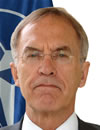Open letter to NATO Secretary-General Jaap de Hoop Scheffer: Invitation to the Republic of Macedonia to join NATO
Among those who have signed the letter are Soren Jessen-Petersen, former Special Representative of the Secretary General and UN Administrator in Kosovo, and former EU Special Representative to Macedonia. Mort Abramowitz, former US Assistant Secretary of State, Daan Everts, former head of OSCE Mission to Kosovo, Gerald Knaus, the Chairman of European Stability Initiative, Edward P. Joseph, former Director of the International Crisis Group and Mark Leonard, the Director of European Council on Foreign Relations, are also signatories.
 |
 |
 |
 |
 |
|
Soren Jessen-Petersen |
Mort Abramowitz |
Daan Everts |
Gerald Knaus |
Edward P. Joseph |
Dear Secretary General:
As twenty European and American senior diplomats, academics, and international officials with long service in and on the Balkans, we are deeply concerned about the prospects for the Republic of Macedonia to join NATO.
We understand and appreciate the Alliance's commitment at Bucharest, provided in paragraph 20 of the Summit Declaration, effectively acknowledging that Macedonia has fulfilled the criteria for entry. We also note, however, that this paragraph appears to make an Alliance invitation to Macedonia contingent upon its coming to terms with Greece over the country's name. If true, this requirement would appear to be at variance with Greece's commitment under the 1995 Interim Accord not to block Macedonia's accession, provided the latter is referred to as "the former Yugoslav Republic of Macedonia."
Given the rejection by Greece of the UN mediator's compromise proposal to resolve the name dispute, "Republic of Macedonia (Skopje)", made after intensive consultations with the parties in the run-up to the Bucharest Summit, we are concerned that no satisfactory solution will be found in time to meet the July deadline for Macedonia to keep pace with its Adriatic Charter colleagues, Albania and Croatia.
It is our view that continuing to protract Macedonia's entry to NATO could have serious consequences for that country's stability and for its neighbor, Kosovo. We believe that the converse is equally true; that issuing Macedonia a prompt invitation to membership would send a most welcome signal of reassurance to all parties in Macedonia who are cooperating in good faith to maintain that country's multiethnic character. A NATO invitation would simultaneously send a timely and necessary signal of caution to all those in and outside the region who would like to keep open the question of final borders in Macedonia, Kosovo or elsewhere in the region.
In short, whatever the Alliance decides to do with respect to Macedonia's invitation could have some impact on regional stability. As you know, the foundation of the international strategy for South-East Europe rests on Euro-Atlantic integration. Any interruption in the path toward NATO or EU membership by a deserving would-be member presents a serious complication for that strategy, and sends a most disconcerting message to the region.
After fifteen years of mediation, the issues and obstacles to the Greek dispute over Macedonia's name are well known. Identity issues have plagued the region since the violent break up of former Yugoslavia began in the early 1990s. NATO played a crucial role in averting major conflict in Macedonia in 2001. A key component of the Ohrid Peace Agreement was the painful concessions to the Albanian minority on identity. Mounting more pressure on the Macedonians to make additional concessions on their identity could be counter-productive.
The answer to the dispute over Macedonia's name lies in fair and reasonable compromise by both sides along the lines proposed by the UN mediator on the eve of Bucharest. We write you confident that you will work maximally to that end with all Alliance members and candidate countries in support of the UN mediation process.
Thank you for your consideration. Please accept the assurances of our highest consideration.
Signed*:
Ambassador Mort Abramowitz, former Assistant Secretary of State
Washington, DC
Ambassador Robert M. Beecroft, former Head of Mission, OSCE Mission to Bosnia-Herzegovina, former U.S. Special Envoy to the Bosnian Federation
Washington, DC
Ambassador Daan Everts, former Head of Mission, OSCE Mission to Kosovo
The Netherlands
Ambassador Robert W. Farrand, former Brcko Supervisor and Deputy High-Representative in Bosnia-Herzegovina
Washington, DC
Ambassador Peter W. Galbraith, former US Ambassador to Croatia
Townshend, Vermont
Ambassador Robert S. Gelbard, former US Special Representative of the President for the Balkans
Washington, DC
Dr. Michael Haltzel, former Staff Director for European Affairs
Senate Foreign Relations Committee
Washington, DC
Ambassador Don Hays, former Principal Deputy High Representative in Bosnia-Herzegovina
Washington, DC
Dr. R. Bruce Hitchner, Chair
Dayton Project, Tufts University
Medford, MA
Soren Jessen-Petersen, former Special Representative of the Secretary General and UN Administrator in Kosovo, and former EU Special Representative to Macedonia
Washington, DC
Edward P. Joseph, former Director
International Crisis Group, Macedonia Project
Visiting Fellow, Johns Hopkins School of Advanced International Studies
Washington, DC
Gerald Knaus, Chairman
European Stability Initiative
Open Society Fellow
Berlin, Germany / Istanbul, Turkey
Mark Leonard, Director
European Council on Foreign Relations
London, UK
Ivan Krastev, Chair
Centre for Liberal Strategies
Sofia, Bulgaria
Dr. James Lyon
Belgrade, Serbia
Dr. Gregory Michaelidis
University at Buffalo, State University of New York
Buffalo, NY
Ambassador Bill Montgomery, former US Ambassador to Bulgaria, Croatia and Serbia-Montenegro
Dubrovnik, Croatia
Gerry Robinson, Q.C., Fellow
Center for the Study of Democracy
Queen's University (Canada)
Toronto, Canada
T.K. Vogel
Brussels, Belgium
Nicholas Whyte, Head of Brussels Office
Independent Diplomat
Brussels, Belgium
BalkanInsight, Macedonia Needs 'Speedy NATO Accession' (19 May 2008)
| Open letter to The Honorable Jaap de Hoop Scheffer, NATO Secretary-General – Invitation to the Republic of Macedonia to join NATO |
